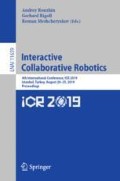Abstract
This study developed the basic principles and algorithms for presenting the semantics of simple extended sentences describing static scenes based on multi-agent cognitive architectures. It is shown that software agents can represent word patterns and concepts corresponding to these words. And such multi-agent algorithms can form the basis for modeling the semantics of relations between concepts, representing various semantic classes in the composition of the sentence.
Access this chapter
Tax calculation will be finalised at checkout
Purchases are for personal use only
References
Anokhin, P.K.: Principal issues of the general theory of functional systems. Principles of the system organization of functions. Science, Moscow (1973)
Chomsky, N.: Language and Thinking. Moscow University Press, Moscow (1972)
Fillmore, Ch.: The case for case. In: Bach, E., Harms, R.T. (eds.) Universals in Linguistic Theory, pp. 1–88. Holt Rinehart and Winston, New York (1968)
Gladky, A.V., Melchuk, I.A.: Elements of mathematical linguistics. Science, Moscow (1969)
Ivanov, P.M, Nagoev, Z.V.: Automatic tracking of a group of objects with a system of enveloping intelligence. In: Materials of the Tenth All-Russian Scientific and Practical Conference “Perspective Systems and Management Tasks”. SFU Publishing House, Taganrog (2015)
Lyutikova, L.A., Ksalov, A.M., Makoeva, D.G., Gurtueva, I.A.: Building a knowledge system based on multi-agent contracts. Natural and Technical Sciences 12(102), 273–274 (2016)
Minsky, M.: Frames to represent knowledge. Energy, Moscow (1979)
Nagoev, Z.V.: Intellect, or Thinking in Living and Artificial Systems. Publishing House KBSC RAS, Nalchik (2013)
Nagoev, Z.V.: Decision-making and in unstructured tasks based on self-organizing multi-agent recursive cognitive architectures. Thesis for the competition. Degrees of Doctor of Technical Sciences. Nalchik (2013)
Nagoev, Z.V.: Multiagent recursive cognitive architecture. In: Chella, A., Pirrone, R., Sorbello, R., Jóhannsdóttir, K. (eds.) Proceedings of the Third Annual Meeting of the BICA Society. Advances in Intelligent Systems and Computing Series, vol. 196, pp. 247–248. Springer, Heidelberg (2012). https://doi.org/10.1007/978-3-642-34274-5_43
Nagoev, Z.V.: Multiagent existential mappings and functions. Izvestiya KBSC RAS 4(54), 64–71 (2013)
Nagoev, Z.V., Lyutikova, L.A., Gurtueva, I.A.: Model for automatic speech recognition using multi-agent recursive cognitive architecture. Procedia Comput. Sci. 145, 386–392 (2018)
Nagoev, Z.V., Nagoeva, O.V.: Building a formalism to describe the semantics of natural language statements and the process of understanding these statements based on self-organizing cognitive architectures. Izvestiya KBSC RAS 4(78), 19–31 (2017)
Pospelov, D.A.: Modeling of reasoning. Experience in the analysis of mental acts. Radio and communication, Moscow (1989)
Russell, S., Norvig, P.: Artificial Intelligence: A Modern Approach (AIMA), 3rd edn. Williams, Moscow (2010)
Schank, R., Birnbaum, L., Mey, J.: Integrating semantics and pragmatics. Quaderni di Semantica VI(2) (1985)
Winograd, T.: Language as a Cognitive Process. Addison-Wesley, Reading (1983)
Acknowledgement
The work was supported by RFBR grants № 18-01-00658, 19-01-00648.
Author information
Authors and Affiliations
Corresponding author
Editor information
Editors and Affiliations
Rights and permissions
Copyright information
© 2019 Springer Nature Switzerland AG
About this paper
Cite this paper
Nagoev, Z., Nagoeva, O., Pshenokova, I., Gurtueva, I. (2019). Multi-agent Model of Semantics of Simple Extended Sentences Describing Static Scenes. In: Ronzhin, A., Rigoll, G., Meshcheryakov, R. (eds) Interactive Collaborative Robotics. ICR 2019. Lecture Notes in Computer Science(), vol 11659. Springer, Cham. https://doi.org/10.1007/978-3-030-26118-4_24
Download citation
DOI: https://doi.org/10.1007/978-3-030-26118-4_24
Published:
Publisher Name: Springer, Cham
Print ISBN: 978-3-030-26117-7
Online ISBN: 978-3-030-26118-4
eBook Packages: Computer ScienceComputer Science (R0)

